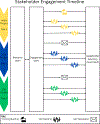Successful implementation of a stakeholder engagement program for pharmacoepidemiologic research
- PMID: 37985010
- PMCID: PMC10841974
- DOI: 10.1002/pds.5727
Successful implementation of a stakeholder engagement program for pharmacoepidemiologic research
Abstract
Purpose: Rigorously conducted pharmacoepidemiologic research requires methodologically complex study designs and analysis yet evaluates problems of high importance to patients and clinicians. Despite this, participation in and mechanisms for stakeholder engagement in pharmacoepidemiologic research are not well-described. Here, we describe our approach and lessons learned from engaging stakeholders, of varying familiarity with research methods, in a rigorous multi-year pharmacoepidemiologic research program evaluating the comparative effectiveness of diabetes medications.
Methods: We recruited 5 patient and 4 clinician stakeholders; each was compensated for their time. Stakeholders received initial formal training in observational research and pharmacoepidemiologic methods sufficient to enable contribution to the research project. After onboarding, stakeholder engagement meetings were held virtually, in the evening, 2-3 times annually. Each was approximately 90 min and focused on 1-2 specific questions about the project, with preparatory materials sent in advance.
Results: Stakeholder meeting attendance was high (89%-100%), and all stakeholders engaged with the research project, both during and between meetings. Stakeholders reported positive experiences with meetings, satisfaction, and interest in the research project and its findings, and dedication to the success of the project's goals. They affirmed the value of receiving materials to review in advance and the effectiveness of a virtual platform. Their contributions included prioritizing and suggesting research questions, optimizing written evidence briefs for a lay audience, and guidance on broader topics such as research audience and methods of dissemination.
Conclusions: Stakeholder engagement in pharmacoepidemiologic research using complex study designs and analysis is feasible, acceptable, and positively impacts the research project.
Keywords: observational research; pharmacoepidemiology; stakeholder engagement.
© 2023 John Wiley & Sons Ltd.
Conflict of interest statement
Disclosures/Conflicts of interest: SJC reports employment of a close family member by a Johnson & Johnson company. GL owned stock in Hologic Inc. EP is co-investigator of a research grant to the Brigham and Women’s Hospital from Boehringer-Ingelheim, outside the submitted work.
Figures
References
-
- Mullins CD, Abdulhalim AM, Lavallee DC. Continuous Patient Engagement in Comparative Effectiveness Research. JAMA. 2012. Apr 18;307(15):1587–8. - PubMed
-
- Berger ML, Sox H, Willke RJ, Brixner DL, Eichler H, Goettsch W, et al. Good Practices for Real-World Data Studies of Treatment and/or Comparative Effectiveness: Recommendations from the Joint ISPOR-ISPE Special Task Force on Real-World Evidence in Health Care Decision Making. Value in Health. 2017. Sep 1;20(8):1003–8. - PubMed
-
- Camelo Castillo W, Heath N, Kim J, Yang K, Ritchey ME, dosReis S, et al. Engaging stakeholders in pharmacoepidemiology research: Current state and recommendations. Pharmacoepidemiology and Drug Safety. 2019;28(6):766–76. - PubMed
-
- Stephens RJ, Whiting C, Cowan K, James Lind Alliance Mesothelioma Priority Setting Partnership Steering Committee. Research priorities in mesothelioma: A James Lind Alliance Priority Setting Partnership. Lung Cancer. 2015. Aug;89(2):175–80. - PubMed
Publication types
MeSH terms
Grants and funding
LinkOut - more resources
Full Text Sources
Medical


